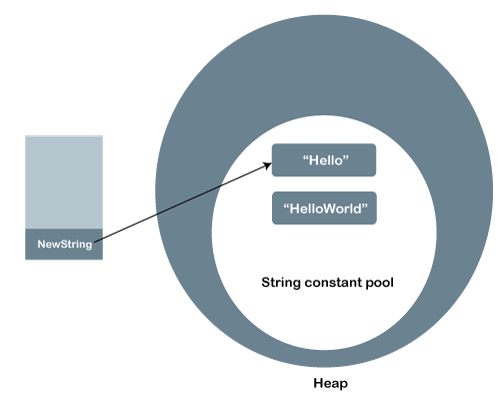Why Are Strings Immutable in Java? Ideal Practices and Usage Situations
Why Are Strings Immutable in Java? Ideal Practices and Usage Situations
Blog Article
Unalterable Strings: A Key Part in Ensuring Information Uniformity and Reliability
In the realm of data monitoring, the significance of unalterable strings can not be overstated. These changeless series of characters play an essential duty in supporting the honesty and accuracy of info within systems. By keeping a state of immutability, data consistency is made certain, fostering a foundation of dependability whereupon essential processes count. The principle of immutable strings goes beyond simple formality; it is a cornerstone in the complex web of information governance. As we explore the benefits, application strategies, and useful applications of unalterable strings, a more clear image arises of their essential nature in safeguarding the digital landscape.
The Principle of Unalterable Strings
Unalterable strings, a fundamental concept in shows, describe strings that can not be customized when they are created. Essentially, as soon as a string worth is appointed, any operation that shows up to modify the string actually creates a new string. This immutability ensures data uniformity and integrity in applications, as it avoids unexpected changes to the initial data.
Advantages in Information Consistency

Information uniformity is critical in various elements of software program advancement, including data source management, multi-threaded settings, and dispersed systems (Why are strings immutable in Java?). Unalterable strings add significantly to attaining this consistency by stopping data corruption due to simultaneous access. In circumstances where several processes or strings engage with the same information concurrently, immutable strings work as a safeguard against race conditions and synchronization problems
Additionally, the immutability of strings simplifies debugging and testing procedures. With immutable strings, programmers can trust that as soon as a string is set, it will stay unchanged, making it less complicated to trace the source of mistakes and making sure that examination cases create consistent outcomes. This reliability in information dealing with inevitably brings about much more steady and durable applications.

Executing Immutable Strings
Making certain the immutability of strings calls for a thoughtful technique to their application in software growth. As soon as a string item is developed, one crucial strategy is to make string classes in a way that prevents modifications. By making strings unalterable, developers can boost data uniformity and dependability in their applications.
To execute immutable strings properly, designers must prefer creating brand-new string objects instead of modifying existing ones. This technique guarantees that once a string is assigned a worth, it can not be changed. Furthermore, any type of operation that shows up to modify the string must create a new string with the wanted modifications rather of modifying the initial.
Additionally, making use of unalterable strings can streamline concurrency management in multi-threaded atmospheres. Since unalterable strings can not be changed after development, they can be securely shared amongst several strings without the risk of data corruption.
Role in Reliability Assurance
In software advancement, the usage of unalterable strings plays a critical role in guaranteeing the dependability of information operations. Immutable strings, as soon as created, can not be modified, making sure that the data they stand for continues to be consistent throughout the application's execution. This immutability residential property supplies a degree of guarantee that the data being refined will not be unintentionally altered, bring about unforeseen results or mistakes in the system.
By including immutable strings right into software program layout, designers can boost the reliability of their applications by reducing the threats related to mutable data - Why are strings immutable in Java?. Immutable strings aid in avoiding data corruption or unintentional adjustments, which can be specifically important when taking care of sensitive details or when data integrity is paramount
Furthermore, using immutable strings simplifies simultaneous processing, as multiple strings can securely accessibility and share string information without the danger of one string modifying the content while an additional reads it. This aspect adds considerably to the total integrity of the software system, guaranteeing constant and predictable actions in data taking care of operations.
Applications and System Assimilation
The smooth combination of unalterable strings right into various applications and systems is crucial for ensuring check this durable data uniformity and integrity throughout varied technological settings - Why are strings immutable in Java?. Unalterable strings play a crucial function in enhancing the stability of data exchanges and communications within complicated software program ecological communities. By including unalterable strings into applications, programmers can minimize the threats related to data tampering, unauthorized alterations, and unintentional modifications, consequently strengthening the general safety and security pose of the system
In the context of system combination, unalterable strings function as a fundamental element for developing secure communication channels and helping with seamless data transfers between various components. Their immutable nature guarantees that information sent between systems continues to be proven and unchanged, lowering the likelihood of incongruities or mistakes that might compromise the integrity of the entire system. In addition, immutable strings can improve interoperability in between disparate systems by providing a standard format for information depiction, enabling more reliable information processing and exchange procedures across interconnected platforms. By adopting immutable strings in applications and system combination processes, organizations can fortify their data facilities and promote the dependability and uniformity of their details possessions.
Final Thought
To conclude, unalterable strings play a vital role in maintaining information uniformity and integrity in various applications and system combinations. By making certain that strings can not be transformed as soon as developed, the honesty of data is maintained, lowering the danger of variances and mistakes. Applying unalterable strings can dramatically boost the reliability of systems, ultimately leading to more reliable and accurate information handling.

Report this page